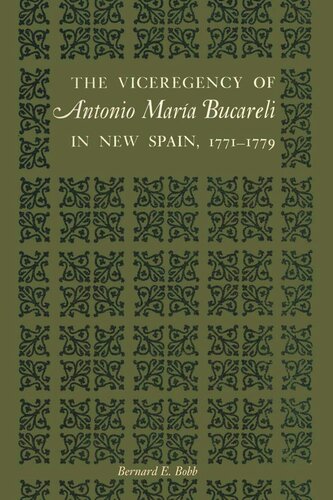

Most ebook files are in PDF format, so you can easily read them using various software such as Foxit Reader or directly on the Google Chrome browser.
Some ebook files are released by publishers in other formats such as .awz, .mobi, .epub, .fb2, etc. You may need to install specific software to read these formats on mobile/PC, such as Calibre.
Please read the tutorial at this link: https://ebookbell.com/faq
We offer FREE conversion to the popular formats you request; however, this may take some time. Therefore, right after payment, please email us, and we will try to provide the service as quickly as possible.
For some exceptional file formats or broken links (if any), please refrain from opening any disputes. Instead, email us first, and we will try to assist within a maximum of 6 hours.
EbookBell Team

4.3
98 reviewsWhen Antonio María Bucareli took up his duties in 1771 as the forty-sixth viceroy of New Spain, he assumed command of a magnificent complexity of land areas, large and small, whose people constituted a cultural and social entity ranging from the traditional Apache to the European gentleman of the Enlightenment. He governed a key area at a significant time. Shortly before Bucareli's arrival in Mexico, José de Gálvez had completed an intensive inspection of the country, had instituted many reforms, and was ready to present the new viceroy with progressive policies for administrative reorganization. How Bucareli, a loyal, indefatigable Spanish aristocrat, reacted to the new order is the particular concern of this book. It examines the actions and reflections of this cautious and conservative man as they relate to certain major problems of his administration: defense, the colonization of the Californias, mining, the Roman Catholic Church, the interior provinces, and—above all—filling Spanish coffers with Mexican pesos as resurgent Spain strove to regain her former position in world affairs. The period of Bucareli's viceregency is seen as a transitional one, during which the seeds of the Enlightenment, of change, even of rebellion, were sown but had not yet begun to sprout. Bucareli, conservative by nature and training, continued to administer New Spain on the basis of a well-established and traditional system, although he supported changes of mere modification or those offering greater efficiency. Evidence of his dual success is the fact that revenues climbed steadily during his tenure and that Charles III was exceptionally pleased with his performance, while at the same time he won from people of all stations a degree of respect and affection far beyond that usually accorded to a viceroy. Prior to the publication of Bucareli, only two other full-scale studies of Spanish viceroys existed, and both of them were concerned with sixteenth-century officials. The appearance of this book, providing at once a study of an important figure and of the system of viceregal administration as it had developed by the latter part of the eighteenth century, filled a long-existing gap in Latin American literature. The heart of this study comes from the prodigious correspondence that passed between the Viceroy and Madrid. Authority for most statements was found in the thousands of documents that the author perused in the Archivo General de Indies in Seville and in the Archivo General de la Nación in Mexico City.